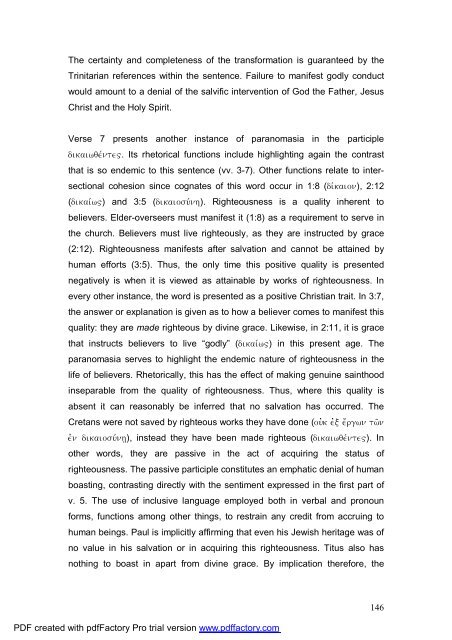A Text centred rhetorical analysis of Paul's Letter to Titus
A Text centred rhetorical analysis of Paul's Letter to Titus
A Text centred rhetorical analysis of Paul's Letter to Titus
Create successful ePaper yourself
Turn your PDF publications into a flip-book with our unique Google optimized e-Paper software.
The certainty and completeness <strong>of</strong> the transformation is guaranteed by the<br />
Trinitarian references within the sentence. Failure <strong>to</strong> manifest godly conduct<br />
would amount <strong>to</strong> a denial <strong>of</strong> the salvific intervention <strong>of</strong> God the Father, Jesus<br />
Christ and the Holy Spirit.<br />
Verse 7 presents another instance <strong>of</strong> paranomasia in the participle<br />
dikaiwqevnte". Its <strong>rhe<strong>to</strong>rical</strong> functions include highlighting again the contrast<br />
that is so endemic <strong>to</strong> this sentence (vv. 3-7). Other functions relate <strong>to</strong> inter-<br />
sectional cohesion since cognates <strong>of</strong> this word occur in 1:8 (divkaion), 2:12<br />
(dikaivw") and 3:5 (dikaiosuvnh). Righteousness is a quality inherent <strong>to</strong><br />
believers. Elder-overseers must manifest it (1:8) as a requirement <strong>to</strong> serve in<br />
the church. Believers must live righteously, as they are instructed by grace<br />
(2:12). Righteousness manifests after salvation and cannot be attained by<br />
human efforts (3:5). Thus, the only time this positive quality is presented<br />
negatively is when it is viewed as attainable by works <strong>of</strong> righteousness. In<br />
every other instance, the word is presented as a positive Christian trait. In 3:7,<br />
the answer or explanation is given as <strong>to</strong> how a believer comes <strong>to</strong> manifest this<br />
quality: they are made righteous by divine grace. Likewise, in 2:11, it is grace<br />
that instructs believers <strong>to</strong> live “godly” (dikaivw") in this present age. The<br />
paranomasia serves <strong>to</strong> highlight the endemic nature <strong>of</strong> righteousness in the<br />
life <strong>of</strong> believers. Rhe<strong>to</strong>rically, this has the effect <strong>of</strong> making genuine sainthood<br />
inseparable from the quality <strong>of</strong> righteousness. Thus, where this quality is<br />
absent it can reasonably be inferred that no salvation has occurred. The<br />
Cretans were not saved by righteous works they have done (oujk ejx e[rgwn tw`n<br />
ejn dikaiosuvnh/), instead they have been made righteous (dikaiwqevnte"). In<br />
other words, they are passive in the act <strong>of</strong> acquiring the status <strong>of</strong><br />
righteousness. The passive participle constitutes an emphatic denial <strong>of</strong> human<br />
boasting, contrasting directly with the sentiment expressed in the first part <strong>of</strong><br />
v. 5. The use <strong>of</strong> inclusive language employed both in verbal and pronoun<br />
forms, functions among other things, <strong>to</strong> restrain any credit from accruing <strong>to</strong><br />
human beings. Paul is implicitly affirming that even his Jewish heritage was <strong>of</strong><br />
no value in his salvation or in acquiring this righteousness. <strong>Titus</strong> also has<br />
nothing <strong>to</strong> boast in apart from divine grace. By implication therefore, the<br />
PDF created with pdfFac<strong>to</strong>ry Pro trial version www.pdffac<strong>to</strong>ry.com<br />
146

















